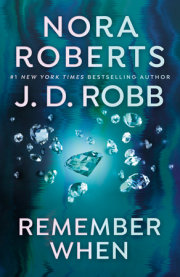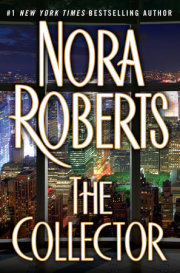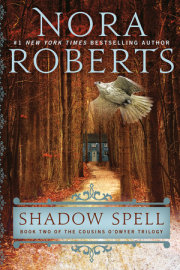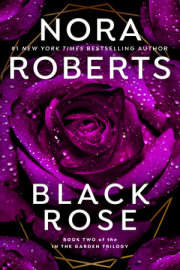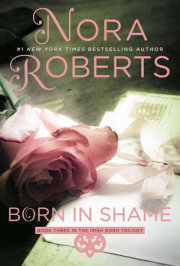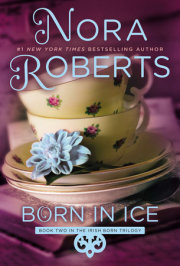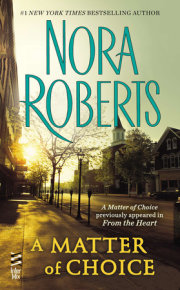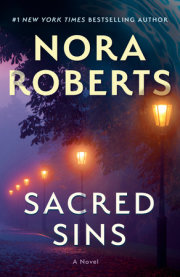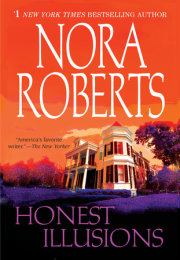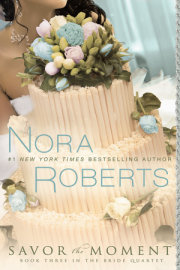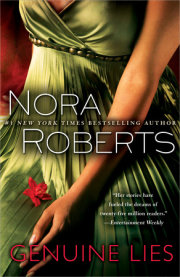1
June 2000
Elizabeth Fitch's short-lived teenage rebellion began with L'Oréal Pure Black, a pair of scissors and a fake ID. It ended in blood.
For nearly the whole of her sixteen years, eight months and twenty-one days she'd dutifully followed her mother's directives. Dr. Susan L. Fitch issued directives, not orders. Elizabeth had adhered to the schedules her mother created, ate the meals designed by her mother's nutritionist and prepared by her mother's cook, wore the clothes selected by her mother's personal shopper.
Dr. Susan L. Fitch dressed conservatively, as suited-in her opinion-her position as chief of surgery of Chicago's Silva Memorial Hospital. She expected, and directed, her daughter to do the same.
Elizabeth studied diligently, accepting and excelling in the academic programs her mother outlined. In the fall, she'd return to Harvard in pursuit of her medical degree. So she could become a doctor, like her mother-a surgeon, like her mother.
Elizabeth-never Liz or Lizzie or Beth-spoke fluent Spanish, French, Italian, passable Russian and rudimentary Japanese. She played both piano and violin. She'd traveled to Europe, to Africa. She could name all the bones, nerves and muscles in the human body and play Chopin's Piano Concerto-both Nos. 1 and 2, by rote.
She'd never been on a date or kissed a boy. She'd never roamed the mall with a pack of girls, attended a slumber party or giggled with friends over pizza or hot fudge sundaes.
She was, at sixteen years, eight months and twenty-one days, a product of her mother's meticulous and detailed agenda.
That was about to change.
She watched her mother pack. Susan, her rich brown hair already coiled in her signature French twist, neatly hung another suit in the organized garment bag, then checked off the printout with each day of the week's medical conference broken into subgroups. The printout included a spreadsheet listing every event, appointment, meeting and meal, scheduled with the selected outfit, with shoes, bag and accessories.
Designer suits; Italian shoes, of course, Elizabeth thought. One must wear good cuts, good cloth. But not one rich or bright color among the blacks, grays, taupes. She wondered how her mother could be so beautiful and deliberately wear the dull.
After two accelerated semesters of college, Elizabeth thought she'd begun-maybe-to develop her own fashion sense. She had, in fact, bought jeans and a hoodie and some chunky-heeled boots in Cambridge.
With cash, so the receipt wouldn't show up on her credit card bill, in case her mother or their accountant checked and questioned the items, which were currently hidden in her room.
She'd felt like a different person wearing them, so different she'd walked straight into a McDonald's and ordered her first Big Mac with large fries and a chocolate shake.
The pleasure had been so huge, she'd had to go into the bathroom, close herself in a stall and cry a little.
The seeds of the rebellion had been planted that day, she supposed, or maybe they'd always been there, dormant, and the fat and salt had awakened them.
But she could feel them, actually feel them, sprouting in her belly now.
"Your plans changed, Mother. It doesn't follow that mine have to change with them."
Susan took a moment to precisely place a shoe bag in the Pullman, tucking it just so with her beautiful and clever surgeon's hands, the nails perfectly manicured. A French manicure, as always-no color there, either.
"Elizabeth." Her voice was as polished and calm as her wardrobe. "It took considerable effort to reschedule and have you admitted to the summer program this term. You'll complete the requirements for your admission into Harvard Medical School a full semester ahead of schedule."
Even the thought made Elizabeth's stomach hurt. "I was promised a three-week break, including this next week in New York."
"And sometimes promises must be broken. If I hadn't had this coming week off, I couldn't fill in for Dr. Dusecki at the conference."
"You could have said no."
"That would have been selfish and shortsighted." Susan brushed at the jacket she'd hung, stepped back to check her list. "You're certainly mature enough to understand the demands of work overtake pleasure and leisure."
"If I'm mature enough to understand that, why aren't I mature enough to make my own decisions? I want this break. I need it."
Susan barely spared her daughter a glance. "A girl of your age, physical condition and mental acumen hardly needs a break from her studies and activities. In addition, Mrs. Laine has already left for her two-week cruise, and I could hardly ask her to postpone her vacation. There's no one to fix your meals or tend to the house."
"I can fix my own meals and tend the house."
"Elizabeth." The tone managed to merge clipped with long-suffering. "It's settled."
"And I have no say in it? What about developing my independence, being responsible?"
"Independence comes in degrees, as does responsibility and freedom of choice. You still require guidance and direction. Now, I've e-mailed you an updated schedule for the coming week, and your packet with all the information on the program is on your desk. Be sure to thank Dr. Frisco personally for making room for you in the summer term."
As she spoke, Susan closed the garment bag, then her small Pullman. She stepped to her bureau to check her hair, her lipstick.
"You don't listen to anything I say."
In the mirror, Susan's gaze shifted to her daughter. The first time, Elizabeth thought, her mother had bothered to actually look at her since she'd come into the bedroom. "Of course I do. I heard everything you said, very clearly."
"Listening's different than hearing."
"That may be true, Elizabeth, but we've already had this discussion."
"It's not a discussion, it's a decree."
Susan's mouth tightened briefly, the only sign of annoyance. When she turned, her eyes were coolly, calmly blue. "I'm sorry you feel that way. As your mother, I must do what I believe best for you."
"What's best for me, in your opinion, is for me to do, be, say, think, act, want, become exactly what you decided for me before you inseminated yourself with precisely selected sperm."
She heard the rise of her own voice but couldn't control it, felt the hot sting of tears in her eyes but couldn't stop them. "I'm tired of being your experiment. I'm tired of having every minute of every day organized, orchestrated and choreographed to meet your expectations. I want to make my own choices, buy my own clothes, read books I want to read. I want to live my own life instead of yours."
Susan's eyebrows lifted in an expression of mild interest. "Well. Your attitude isn't surprising, given your age, but you've picked a very inconvenient time to be defiant and argumentative."
"Sorry. It wasn't on the schedule."
"Sarcasm's also typical, but it's unbecoming." Susan opened her briefcase, checked the contents. "We'll talk about all this when I get back. I'll make an appointment with Dr. Bristoe."
"I don't need therapy! I need a mother who listens, who gives a shit about how I feel."
"That kind of language only shows a lack of maturity and intellect."
Enraged, Elizabeth threw up her hands, spun in circles. If she couldn't be calm and rational like her mother, she'd be wild. "Shit! Shit! Shit!"
"And repetition hardly enhances. You have the rest of the weekend to consider your behavior. Your meals are in the refrigerator or freezer, and labeled. Your pack list is on your desk. Report to Ms. Vee at the university at eight on Monday morning. Your participation in this program will ensure your place in HMS next fall. Now, take my garment bag downstairs, please. My car will be here any minute."
Oh, those seeds were sprouting, cracking that fallow ground and pushing painfully through. For the first time in her life, Elizabeth looked straight into her mother's eyes and said, "No."
She spun around, stomped away and slammed the door of her bedroom. She threw herself down on the bed, stared at the ceiling with tear-blurred eyes. And waited.
Any second, any second, she told herself. Her mother would come in, demand an apology, demand obedience. And Elizabeth wouldn't give one, either.
They'd have a fight, an actual fight, with threats of punishment and consequences. Maybe they'd yell at each other. Maybe if they yelled, her mother would finally hear her.
And maybe, if they yelled, she could say all the things that had crept up inside her this past year. Things she thought now had been inside her forever.
She didn't want to be a doctor. She didn't want to spend every waking hour on a schedule or hide a stupid pair of jeans because they didn't fit her mother's dress code.
She wanted to have friends, not approved socialization appointments. She wanted to listen to the music girls her age listened to. She wanted to know what they whispered about and laughed about and talked about while she was shut out.
She didn't want to be a genius or a prodigy.
She wanted to be normal. She just wanted to be like everyone else.
She swiped at the tears, curled up, stared at the door.
Any second, she thought again. Any second now. Her mother had to be angry. She had to come in and assert authority. Had to.
"Please," Elizabeth murmured as seconds ticked into minutes. "Don't make me give in again. Please, please, don't make me give up."
Love me enough. Just this once.
But as the minutes dragged on, Elizabeth pushed herself off the bed. Patience, she knew, was her mother's greatest weapon. That, and the unyielding sense of being right, crushed all foes. And certainly her daughter was no match for it.
Defeated, she walked out of her room, toward her mother's.
The garment bag, the briefcase, the small, wheeled Pullman were gone. Even as she walked downstairs, she knew her mother had gone, too.
"She left me. She just left."
Alone, she looked around the pretty, tidy living room. Everything perfect-the fabrics, the colors, the art, the arrangement. The antiques passed down through generations of Fitches-all quiet elegance.
Empty.
Nothing had changed, she realized. And nothing would.
"So I will."
She didn't allow herself to think, to question or second-guess. Instead, she marched back up, snagged scissors from her study area.
In her bathroom, she studied her face in the mirror-coloring she'd gotten through paternity-auburn hair, thick like her mother's but without the soft, pretty wave. Her mother's high, sharp cheekbones, her biological father's-whoever he was-deep-set green eyes, pale skin, wide mouth.
Physically attractive, she thought, because that was DNA and her mother would tolerate no less. But not beautiful, not striking like Susan, no. And that, she supposed, had been a disappointment even her mother couldn't fix.
"Freak." Elizabeth pressed a hand to the mirror, hating what she saw in the glass. "You're a freak. But as of now, you're not a coward."
Taking a big breath, she yanked up a hunk of her shoulder-length hair and whacked it off.
With every snap of the scissors she felt empowered. Her hair, her choice. She let the shorn hanks fall on the floor. As she snipped and hacked, an image formed in her mind. Eyes narrowed, head angled, she slowed the clipping. It was just geometry, really, she decided-and physics. Action and reaction.
The weight-physical and metaphorical, she thought-just fell away. And the girl in the glass looked lighter. Her eyes seemed bigger, her face not so thin, not so drawn.
She looked . . . new, Elizabeth decided.
Carefully, she set the scissors down, and, realizing her breath was heaving in and out, made a conscious effort to slow it.
So short. Testing, she lifted a hand to her exposed neck, ears, then brushed them over the bangs she'd cut. Too even, she decided. She hunted up manicure scissors, tried her hand at styling.
Not bad. Not really good, she admitted, but different. That was the whole point. She looked, and felt, different.
But not finished.
Leaving the hair where it lay on the floor, she went into her bedroom, changed into her secret cache of clothes. She needed product-that's what the girls called it. Hair product. And makeup. And more clothes.
She needed the mall.
Riding on the thrill, she went into her mother's home office, took the spare car keys. And her heart hammered with excitement as she hurried to the garage. She got behind the wheel, shut her eyes a moment.
"Here we go," she said quietly, then hit the garage-door opener and backed out.
She got her ears pierced. It seemed a bold if mildly painful move, and suited the hair dye she’d taken from the shelf after a long, careful study and debate. She bought hair wax, as she’d seen one of the girls at college use it and thought she could duplicate the look. More or less.
She bought two hundred dollars' worth of makeup because she wasn't sure what was right.
Then she had to sit down because her knees shook. But she wasn't done, Elizabeth reminded herself, as she watched the packs of teenagers, groups of women, teams of families, wander by. She just needed to regroup.
She needed clothes, but she didn't have a plan, a list, an agenda. Impulse buying was exhilarating, and exhausting. The temper that had driven her this far left her with a dull headache, and her earlobes throbbed a little.
The logical, sensible thing to do was go home, lie down for a while. Then plan, make that list of items to be purchased.
But that was the old Elizabeth. This one was just going to catch her breath.
The problem facing her now was that she wasn't precisely sure which store or stores she should go to. There were so many of them, and all the windows full of things. So she'd wander, watch for girls her age. She'd go where they went.
She gathered her bags, pushed to her feet-and bumped into someone.
"Excuse me," she began, then recognized the girl. "Oh. Julie."
"Yeah." The blonde with the sleek, perfect hair and melted-chocolate eyes gave Elizabeth a puzzled look. "Do I know you?"
"Probably not. We went to school together. I was student teacher in your Spanish class. Elizabeth Fitch."
"Elizabeth, sure. The brain trust." Julie narrowed her sulky eyes. "You look different."
"Oh. I . . ." Embarrassed now, Elizabeth lifted a hand to her hair. "I cut my hair."
"Cool. I thought you moved away or something."
"I went to college. I'm home for the summer."
"Oh, yeah, you graduated early. Weird."
"I suppose it is. Will you go to college this fall?"
"I'm supposed to go to Brown."
"That's a wonderful school."
"Okay. Well . . ."
Copyright © 2023 by Nora Roberts. All rights reserved. No part of this excerpt may be reproduced or reprinted without permission in writing from the publisher.





